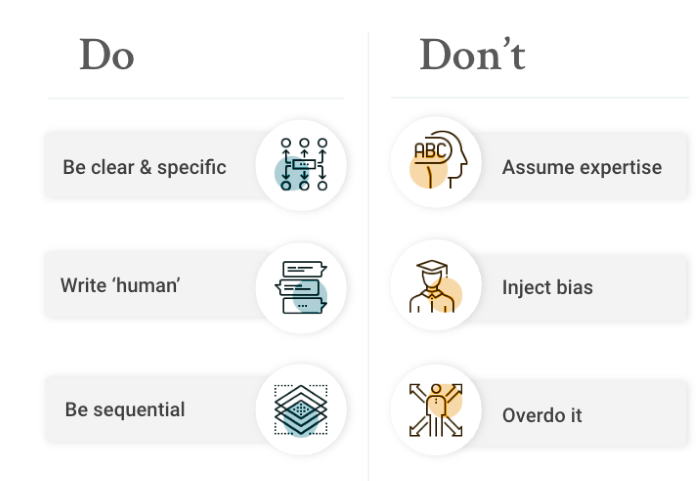Last year proved generative AI is here to stay. This year, marketers have to make it work at scale.
In this 20-minute webinar, Adam Smartschan, Altitude’s Chief Strategy Officer, teaches you how generative AI tools like ChatGPT can really impact SEO workflows. They’re not going to write your content for you. But they can provide value in any number of ways, helping you produce higher-quality, higher-ranking work faster than you ever thought possible. Watch the full video below. Or read on for the essentials.
The Myth of GenAI
ChatGPT, or any generative AI for that matter, is not a magic bullet capable of replacing humans who generate content or execute SEO strategies. Contrary to initial concerns, the reality is that generative AI will only partially revolutionize SEO. Humans are still crucial to the process.
The human element is especially pivotal in Google’s current algorithmic preferences, which prioritize helpful content. Over the past year, Google has underscored the significance of originality, substance, and insight in the content it values. Original reporting, research, and analysis, combined with comprehensive views on a topic, align with Google’s criteria for delivering relevant and valuable recommendations to users. These are skills that AI cannot reproduce.
That means you still need the nuance only a human can provide to rank at the top. That being said, there are still many practical ways you can put GenAI to work.
GenAI's SEO Superpower
Google (and most other search engines) have one overarching goal: To serve as many users as usefully as possible. A typical search query won’t necessarily provide you with the most insightful or deepest-researched answer. Instead, it’s going to give you the average answer. That’s why one of the top results to the query “How do antibiotics work?” comes from the publication Healthline–not a 150-page dissertation from the researchers directly in the lab.
GenAI operates in much the same way. It gives the information version of the color gray. It is able to synthesize vast amounts of data and return the average of that data–in a very similar manner to how Google weighs its own algorithm.
Subject matter experts rely on their own technical jargon and idiosyncrasies. They word things in ways that Google doesn’t like. AI has the ability to counter that. If you use AI as a starting point–outlining a blog post or providing a set of keywords–you’ll be able to strip away some of your industry-specific bias and start to bring your work closer to what the average person wants–thus, precisely what Google’s algorithm wants.
Do’s and Don’ts When Using GenAI for SEO
Google’s guidance now says content needs to be written for people, but it no longer punishes content created with GenAI’s help. That means your output and efficiency might double if you use it right. Critically, though, AI still can’t replace you. The content it writes isn’t good enough.
Think of GenAI as a really great intern. Would you ask your intern to execute every article your organization produces without oversight? Of course not. Would you ask that intern to help you brainstorm, pitch blog ideas, or copy edit for grammatical mistakes? Absolutely. To use AI proficiently, here are some key guidelines.

- Be Clear and Specific: Ask AI a question like “Write me a blog about Antibiotics” and you will get a response. It just won’t be any good. The more specific you are with your query, the better your response will be. Need a list of topics? Ask for an exact amount. Want to change the tone of a headline, provide an example of one you like.
- Write Like a Human: It might seem obvious, but good, clear language matters. Talk like you are writing to a human, and it will respond in a similar tone.
- Be Sequential: Don’t start by asking for the end product (like, “Write a blog for me”). Instead, talk to the GPT like you would your intern–starting with clear, basic tasks and getting more specific as you go.
- Don’t Assume Expertise: AI can accomplish mundane and routine tasks quickly. But it’s not a subject matter expert. You are. It will help you create ideas or act as a sanity check. But it won’t provide all the answers. Be especially wary of facts, which are not guaranteed to be accurate inside the language model
- Don’t Inject Bias: If you put in a long string of highly technical language that is difficult for the average person to understand, the AI will most likely return a response with that exact same technical language. Be cautious when injecting your personal (and probably incredibly specialized) bias into your prompt.
- Don’t Overdo It: Avoid the tendency to over-engineer your prompts. Asking questions like “Can you write this more like a human,” won’t work. There are simply no magic words that will make AI’s end product better.
Conclusion: AI is a Fantastic SEO Intern, But You Are Still Essential
GenAI won’t use its massive amount of training data to always give the right answer. It’s much more likely to return the average answer. That’s crucial for SEO, because too much jargon or hyper-technical language in content won’t excel within Google’s algorithm. Using AI as a sanity check, starting point, or personal assistant can boost your productivity and provide guard rails that sync with the algorithm.
But remember that Google values originality and expertise–things a robot does not provide. You, at the end of the day, are the only one with the nuance to bring humanity into your content.
Ready to elevate your B2B marketing?
We help leading business-to-business brands hit their marketing goals. Get in touch to learn how Altitude Marketing can help you reach your peak performance.


